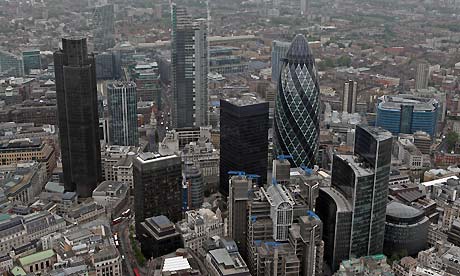Tackling energy consumption in cities using 'Smart' technologies will help to cut carbon emissions, says Molly Webb

Yesterday I made my way to Waterloo in London, had a breakfast meeting at a cafe, went to the office, took the tube to a meeting, grabbing food on the way, and again took the tube to meet friends for dinner.
This is being repeated in cities across the planet, over 3 billion people are eating meals, shopping, working in office buildings, using mobile phones, and traveling to school, work or the office. And many more are aspiring to these lifestyles, and tasking their governments with providing them.
This is why cities are responsible for 80% of global energy consumption, and why they contribute to over half of the world's greenhouse gas emissions; trends which are set to continue. By 2020 70% of China's population will be middle class, and by 2050, nearly 70% of the world's population will live in cities.
If we want to tackle climate change, changing the way we consume energy in cities is a good place to start. Our SMART 2020 report showed that 15% of emissions could be saved in 2020 through 'smart' (information and communications) technologies that achieve energy and resource efficiency through better monitoring and management of transport, buildings, electricity and industry.
So how will 'smart' cities help us deal with tackling climate change and growth at the same time? There are 5 key areas emerging for 'smart' services that enable a sustainable, low carbon city.
1. Monitoring and managing the "footprint" of the city for decision-makers
2. Connected mobility solutions to enable modal shift, and electric vehicles
3. Distributed and community energy solutions
4. Smarter buildings that are transparent about energy consumption, use and generation
5. Smart energy, water and waste management
2. Connected mobility solutions to enable modal shift, and electric vehicles
3. Distributed and community energy solutions
4. Smarter buildings that are transparent about energy consumption, use and generation
5. Smart energy, water and waste management
Behind these key areas are technology solutions like 'smart meters' and the 'smart grid', which have been widely covered in the news.
But how much more efficient could we really make our lifestyles, today? Could we turn down the office heating without sacrificing comfort? Could we work flexibly, modify our travel patterns, and still achieve the business and mobility services we have come to rely on?
Companies are saying "yes". Last week's Economist special report Smart Systems showed that tech companies are actively pursuing new business opportunities to enable efficiency. Companies will be providing hardware and services that sense, collect, compress, visualise and manage data, sending it to the right people at the right time to automate processes, or allow different decisions to be made.
Siemens expects 40 billion euro of green revenue by 2014. IBM's smarter planet solutions revenues are growing faster than the rest of their business.
But the value isn't just for companies. Demand for smart cities is growing from citizens and governments. The green digital charter commits 22 city signatories to deploying 5 ICT projects each to 2015. Songdo, Tianjin and Masdar are all thinking of 'smart' as part of city development for the 21st century. 74% of citizens think that having better access to energy information will help them save energy, according to a survey by Siemens.
We can't expect people to care about a smart grid, but they certainly care about comfort, cost-savings and preserving the environment for their children. As we make choices every day, we'd like the technology to be in place so that our choices contribute to solutions, not to ever more problems. We may find it more convenient to get on a pay-as-you-go bike than to get on a bus, and this means emissions are reduced at the same time.
We can't expect people to care about a smart grid, but they certainly care about comfort, cost-savings and preserving the environment for their children. As we make choices every day, we'd like the technology to be in place so that our choices contribute to solutions, not to ever more problems. We may find it more convenient to get on a pay-as-you-go bike than to get on a bus, and this means emissions are reduced at the same time.
But a gap remains between the opportunity to achieve system changes across the city and the current state of deployment, and it requires much more than new technologies. The findings from a recently launchedsustainability index developed by Columbia University, Tsinghua University and McKinsey show clearly that the cities in China which are growing fastest are also the ones with the best environmental performance; ie: they are providing mass transit for citizens, access to clean water and reducing pollution levels from factories. Cities achieved this through policy – not technology; through better planning of mass transit and urban services, clear targets for industry, clear monitoring standards, coordination of policy and investments into resource efficiency.
The case for a smart city is still being made. But smart cities will matter to all of us if they can make sustainability a matter of course. As Nicky Gavron, former Deputy Mayor of London, said recently at the Metropolis association of city governments meeting in Barcelona, "Cities are more than laboratories. If we get this right, they will make the difference in both tackling climate change and driving sustainable economic growth."
• Molly Webb is Head of Smart Technology at The Climate Group, where the SMART 2020 Initiative will support policy and financing for 'smart' solutions, with the aim of developing pilot projects in 10 cities by 2013.
No comments:
Post a Comment